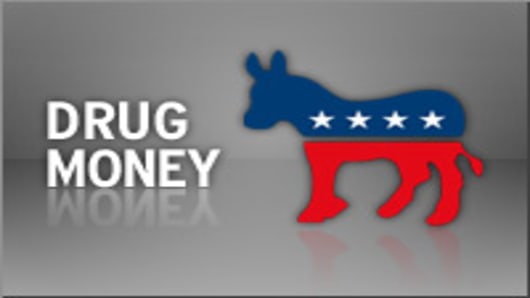On the eve of the make-or-break Texas-Ohio primaries for Sen. Hillary Clinton, she remains in first place in at least one "poll." The Center for Responsive Politics has updated its list of top pharmaceuticals/health products-industry money recipients based on the most recent campaign finance reports and the former First Lady edges out Sen. Barack Obama by about $36,000.
But, when the CRP, on its web site, www.opensecrets.org, breaks it down to just the drug manufacturers (i.e. Amgen , Pfizer ,GlaxoSmithKline , etc.), Obama beats Clinton by 3-grand. Sen. John McCain remains in 15th place on the list of presidential/congressional candidate recipients of money from pharma/health products. But since the last report, he's moved up two notches to 11th position on the recipient list from drugmakers. Gov. Mike Huckabee doesn't appear in the top-20 in either category.
You can check out the pharma/health products recipient list here and thedrug manufacturers' list here.
According to the CRP, the pharma/health products sector is now splitting its donations evenly between Democrats and Republicans. In the last presidential election cycle it favored the GOP by a two-to-one margin. While the drugmakers, so far, have given 47 percent of their campaign cash to Dems and 53 percent to Republicans. In 2004, it was 30-70, respectively.
Biotech behemoth Amgen is still the biggest giver (nearly three-quarters of a million dollars), followed by Pfizer, Glaxo, Johnson and Johnson and Roche (which owns a majority stake in another biotech giant, Genentech ). Most, but not all, of the individual drug companies are giving more of their money to Republicans (Pfizer, whose CEO has twice given the maximum personal contribution to Clinton, is one of the exceptions).
And, interestingly, generic drugmaker Mylan Labs , favors Democrats (67 percent) over Republicans (33 percent). Perhaps the conventional political wisdom there is that the Dems might work harder to make it easier to get cheaper generic drugs to market. And sleeping pill manufacturer Sepracor (it makes Lunesta--the one with the opaque butterfly in the commercial) has thrown 83 percent of its cash at Democrats.
Analysts say the industry is simply trying to make sure it has a place at the table if/when healthcare reform is discussed. Others say it supports their thesis that the Democrats' bark might be worse than their bite--that yes, there's a lot of populist campaign rhetoric about "taking on the drug companies," but that the financial support may be a better "tell" of their true position when push comes to shove. Our chief political correspondent, John Harwood, says the flow of pharma funds to the presidential candidates tells you more about the way the election is tilting than any voter poll.
Questions? Comments? Pharma@cnbc.com


